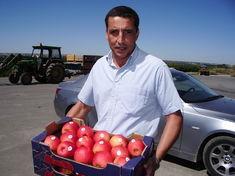
Spanish producers have established a firm footing in the UK for a whole host of products, from salad onions to citrus. When it comes to apples, on the other hand, Spain is unlikely to be the first place that springs to mind. For Spanish apple grower, Xavier Codina, however, this is a travesty that strongly merits redress.
Following a meeting with John Cripps in Australia four years ago, Codina planted 20,000 acres of Pink Kiss, a derivative of Cripps Pink, in his native region outside Lleida, in Catalonia, northern Spain. Lleida is one of the four main apple-growing regions in Catalonia. Codina says the town was once the heart of a thriving horticulture industry, with production sites spanning a 40km radius from the centre.
However, as a result of perpetually poor prices, the industry has lessened significantly, especially in the last three years, says Codina. “The landscape is really changing. Many businesses have folded and the land used for growing fruit and vegetables has been grubbed.”
Codina claims this state of affairs is highly regrettable, given the region’s favourable growing conditions, especially for certain varieties of apples. Catalonia is responsible for some Golden Delicious, Royal Gala and other Gala derivatives, such as Brookfield and Galaxy. However, growers have often experienced problems producing the correct colour for Gala types, owing to its frequent periods of intensive sunshine, making the fruit too yellow, Codina explains. The same is true of Granny Smith, he says, which is only produced for the domestic market which is not so stringent on quality checks.
The Catalonian conditions are particularly conducive to growing Cripps Pink varieties, says Codina. “We can produce apples which have a far better colour than the Pink Lady in France, South Africa, or even Australia. We have a similar climate to Australia but wetter weather in August and a chilling fog in November. The earth is very poor and dry but very rich in carbonates which the apples love, and they have a very well-developed root structure ,which enables them to retain water efficiently. We can produce brix levels of 18-20.” Codina says his apples, and the Pink Lady apples produced by his neighbour, are far more pink than the apples produced in the countries readily associated with the brand, which he claims are habitually fairly green in colour.
This year has been disappointing for Codina, since the incidence of two hail storms has rendered 80 per cent of his crop unsuitable for export. To prevent a recurrence of these fateful events, he is set to visit Brazil in October to purchase a special kind of netting produced there.
Despite this setback, in the last three years, Codina has seen his yields of Pink Kiss increase from 50 tonnes to 160t to 300t due for harvest this year. However, his trees are still only in the early stages of development, and next year he is expecting to pick 600t, with volumes rising rapidly in the years to come.
Since his trees have started to produce commercial volumes, Codina has been looking to forge links with importers and buyers in Europe’s main apple markets. Last year he sent 60 per cent of his crop to Germany, with lesser volumes to the UK and France, and class two fruit absorbed by the domestic market.
In Germany, Codina has been working directly with one of the biggest supermarkets, Edeka, while in the UK he is developing links with various importers on the wholesale markets. France has been more difficult to penetrate, he says. However, the French have long been particularly scathing about Spanish apples, considering their produce distinctly superior, he claims. “The French have a history of growing apples and they have the best techniques, of course. But they cannot produce the best colours. And now, with refrigerated transportation, there is no reason to say that because France is closer than Spain, it is the best source.”
Spanish producers have traditionally failed to help themselves in promoting their strengths, Codina says, and he believes his ambitious mentality is rather unique, which is why the country’s industry as a whole has been somewhat remiss in entering the European market. “It is not in their mentality to push what they have,” he says. “They are happy stopping here in Spain and don’t think about expanding to other countries. But the conditions are perfect here to produce really good apples.”
Codina is very keen to strengthen his relationships with the UK industry but questions whether it will welcome the naturally large sizes of his apples. He regrets to admit that they may be deemed unsuitable, given the specifications dictated by the UK supermarkets, and says he is continually surprised thatUK consumers continue to support this situation. “I remember when I lived in Ireland, I thought: this is not fruit,” he says. “It should be twice or three times the size of this. This is just a poor imitation of what nature produces.”
In any case, it is much more difficult to produce the smaller sizes, as his neighbouring farmers producing Pink Lady and Royal Gala for the UK market readily testify, he says. The apples are not only naturally inclined to grow much larger but producing smaller sizes requires much stricter monitoring and all the trees’ flowers to be removed, which is not good for the trees, he claims.
Codina is not about to let the possibility of such rejection hold him back, however. Despite the threat of adverse weather patterns or more bureaucratic hindrances, he will continue to look to the future. As well, as securing EurepGAP certification by the end of the year, he has already invested in 200 new plantings and is experimenting with different soil solutions for them to maximise their growth potential.



